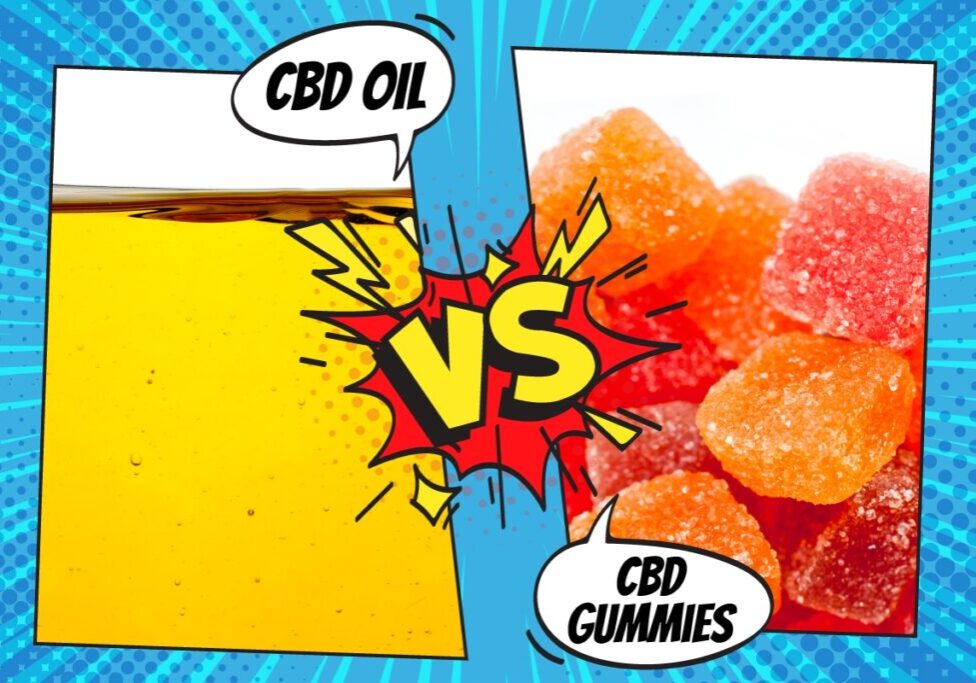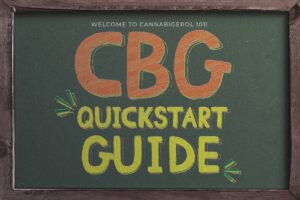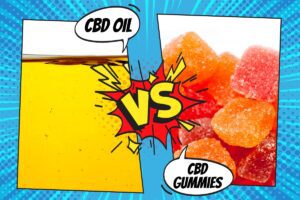Hemp-derived CBD extract is one of the most versatile medicinal compounds there is. It mixes well with just about anything, so you have tons of options when deciding how to take it.
But what is the best way to take CBD?
Surprisingly, there isn’t one answer because everybody is unique! This has led to a spirited debate in CBD Land over which of the two most popular product choices — CBD oil vs. gummies — is the best way to take CBD for pain, anxiety, and other everyday wellness concerns.
Join us in today’s CBD 101 blog as we settle the debate in a head-to-head showdown, where you ultimately decide who wins as judge, jury, and CBD shopper. We’ll break down the different types of CBD used in oil and gummy products, discuss how their potential health benefits might fit into your wellness plan, and help you make the most informed choice between CBD tincture vs gummies.
When choosing between CBD oil vs. gummies, what should I consider?
Think about how you experience your everyday wellness concerns. Now, imagine what matters most when taking CBD to help you feel better:

Can’t decide which product type is right for you? Consider adding both! You can take CBD oil daily and keep your gummies on hand whenever you need an on-the-go boost of health benefits.
What’s in CBD oil vs. CBD gummies?
Cannabidiol (a.k.a. CBD for short) is the active ingredient in CBD oils and gummy products that helps you feel better naturally.

RELATED READING: Take a deep dive into the healing power of cannabidiol (CBD)
CBD used in over-the-counter tinctures and gummy formulations comes from legal hemp plants. Three distinct forms of hemp extract give users lots of flexibility for their many varied needs. Which type of extract a product is made with is often one of the primary deciding factors for people buying CBD oil or CBD gummies online.
Now, let’s take a closer look at the three types of CBD to see which one might be right for you:
Full spectrum CBD
Products made with a type of extract called full spectrum CBD contain the most complete medicinal profile because they are minimally processed. As a result, CBD gummies and oils that use full spectrum extract may be more effective due to a synergistic phenomenon cannabis researchers call the entourage effect.
Full spectrum extracts contain a small amount of the psychoactive compound THC (less than 0.3 percent). It’s not enough to cause intoxication or mind-altering effects in most people. Still, some CBD users may be hypersensitive to it or prefer to avoid THC altogether. The following two forms of CBD might be a better lifestyle fit if this sounds like you.

RELATED READING: Full spectrum VS broad spectrum CBD extract
Broad spectrum CBD
CBD gummy formulations and oil tinctures made using broad spectrum extract have many of the same medicinal compounds as the full spectrum variety but with no THC (0.0% according to third-party lab testing). The additional step of removing THC from broad spectrum extracts diminishes up to 50% of the more fragile cannabis plant medicines. But broad spectrum CBD still provides comparable entourage effects to full spectrum tinctures and gummy bears.
CBD isolate oil
CBD isolate is a radically purified form of hemp extract. It undergoes numerous specialized filtration processes to isolate single cannabidiol (CBD) molecules from other cannabis compounds.
High quality CBD oil from Zero High® brands is made with isolate powder that’s 99.77% pure CBD and nothing else — not even a hint of THC (0.00% according to third-party lab testing). CBD isolate oils are perfect for people who need the super-concentrated raw power of pure CBD.

RELATED READING: The complete guide to CBD isolate powder and oil
Other ingredients in CBD oil vs CBD gummies
Additional ingredients in tincture and gummy products from other CBD brands may vary, depending on the manufacturer.
Cannabiva® company CBD oil tinctures are made with just two simple ingredients: Organic hemp extract and medium-chain triglyceride (MCT) oil derived from organic coconuts. Vegan gummy products from Cannabiva are made with organic hemp extract and contain sugar, tapioca syrup, filtered water, pectin blend, natural colors and flavors, and citric acid.
Many CBD companies disguise subpar products with synthetic flavors and cheap additives. Check the nutrition facts label on your product for ingredient contents. Always look for a third-party lab report called a Certificate of Analysis (COA) to see what’s in your product.
All Cannabiva brand formulations are third-party lab-tested. To view the COA, scan the QR code on your CBD product label with your smartphone.

DID YOU KNOW
Oil tinctures and gummies contain the same active ingredient — cannabidiol (CBD) — so they provide the same overall benefits.
Which one works faster?
How you take CBD determines how fast it works, how much your body absorbs, and how long it lasts.
Taking CBD sublingually (a.k.a. under the tongue) and swallowing it are the two most common ways people use it. These might sound like the same thing, but they work differently. Each method has unique benefits. For most people, the method of use is a primary deciding factor in choosing between gummies vs oil CBD.
Let’s explore action speed and the onset of benefits for both methods to help you decide which one sounds like a better fit:
Sublingual CBD oil use
Taking CBD under the tongue is the fastest way to experience results. The main advantages of sublingual CBD oil are quick absorption and rapid onset of potential health benefits.
Some users taking CBD tinctures under the tongue report feeling effects within minutes of use. Individual results may vary.

RELATED READING: What does CBD oil taste like?
CBD absorbs immediately upon contact with the tiny blood vessels and capillaries in your mouth, entering the bloodstream within minutes. This is why oil tinctures are the best way to take CBD for anxiety and other wellness concerns that have a quick onset and require a rapid response.
Oral CBD doses
Gummies and CBD edible products like honey sticks offer a tastier way to consume your favorite hemp-derived medicine. However, oral CBD use does not have the rapid-acting onset that sublingual use does.
Your digestive system is the bottleneck to feeling oral CBD doses kick in right away. On average, oral use takes about an hour before enough CBD builds up in your bloodstream to promote health benefits. It may take another two or three hours to reach peak effects.
CBD edibles and oral CBD oil (swallowing immediately without holding oil under the tongue) are perfect for people who enjoy a gradual onset of benefits.

DID YOU KNOW
Can’t decide which way you want to take CBD? Try both to see which you love best!
What’s the right amount of CBD oil or gummies to take?
The average user takes between 25 mg and 50 mg of CBD daily. The amount you need depends on your weight.
Use the CBD dosage chart below to find your weight category, then choose your preferred dose strength:

CBD dosages range from 25 mg to 1500 mg, depending on the person. Because everyone is unique, your daily dose may vary from that of other CBD users, even if you have similar body weights.

DID YOU KNOW
When you take CBD with a fatty meal (30% or more calories from fat), you increase its absorption by up to 1300%!
How do I measure CBD oil drops vs gummies?
CBD oil products with graduated droppers offer the best dosage precision compared to CBD gummy formulations. Refer to your tincture product’s dosage strength per dropper to measure how much oil tincture you need in each dose.
How much CBD gummies equals your recommended daily dose depends on the amount of CBD per gummy piece. Full spectrum and broad spectrum CBD gummies from Cannabiva are standardized with a 25 mg dose per gummy. Bite your gummy dose in half or quarters to get closer to your suggested range.
CBD gummies vs tincture FAQ
You may have some additional questions before making your final judgment on CBD gummies vs. oil tinctures.
Review these answers to the most frequently asked questions comparing the two CBD options. Talk to a Cannabiva Sales Associate if there’s something we haven’t covered in today’s CBD 101 blog post.














